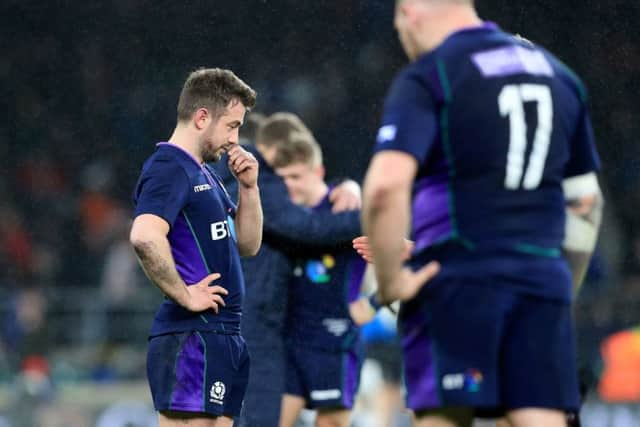Allan Massie: Twickenham comeback may bode well for Scotland’s Rugby World Cup hopes
After the Welsh match Tom English, late of this parish, wrote that if Wales have forgotten how to lose, Scotland have forgotten how to win.
This was a harsh judgement, not however without substance – and sadly it might be repeated again this week.
Advertisement
Hide AdAdvertisement
Hide AdAfter the most unexpected, sublime, spirited, skilful and romantic of comebacks at the Castle of Doom, aka Twickenham, Gregor Townsend’s Scotland had overturned a 31-point deficit and coming into the last minute were, astonishingly, seven points in the lead. It was a second-half performance that any writer of old-fashioned school stories would have hesitated, and blushed, to offer.


So when Finn Russell kicked into touch in the England 22 the match was all but won. But England attacked from deep. When their left wing, Jonny May, was tackled out wide, we failed to knock or pull him into touch, and then – calamity, calamity – we gave away a silly, utterly unnecessary, penalty at a ruck in midfield and... you know the rest.
Forgetting how to win? The Munster side of Anthony Foley or Paul O’Connell, accustomed so often to snatching victory from the jaws of defeat, would never, one thinks, have conceded a penalty in that place at that time. But Scotland did. Sad. Of course the match would even then have been beyond England’s reach if either of Darcy Graham’s tries had been converted.
One can’t reasonably add missed penalties to a side’s score, but missed conversions may legitimately be remembered with regret.
Dark disappointment at the failure to win at Twickenham for the first time since 1983 shouldn’t however obscure the glory of that second-half comeback.
There was glory in the character shown, but also in the high level of skill and the daring adventure. Five tries were scored to add the Stuart McInally’s runaway one, outpacing England’s flier May, just before half-time.
Any of the other five might qualify for a try of the weekend competition: the coolness of the build-up for young Darcy’s first, and the nimble agility he showed in a narrow congested space; Ali Price’s break, chip, collection and awareness of Magnus Bradbury coming on a storming run on the inside; Finn Russell’s alert interception of Owen Farrell’s pass and then his juggling-act as he sprinted clear; his gorgeous over-the-defence pass to Sean Maitland allowing him to release Darcy Graham who nevertheless had to swerve in narrow space to wrong-foot Elliot Daly and get over the line; and finally the pop-pass which set Sam Johnson free to gallop half the length of the field, outpacing, outwitting and fending off at least four England backs.
What accounted for the transformation? There has been talk of argument in the dressing-room at half-time. It would be extraordinary if harsh words weren’t spoken then. But I couldn’t discern any tactical change.
Advertisement
Hide AdAdvertisement
Hide AdIt seemed we were playing the same game only faster, more securely, better and with ever-greater confidence and audacity. The shift was mirrored in the performance of the two fly-halves: Owen Farrell first calm and commanding, then losing confidence and making mistakes, Finn Russell moving from an error-strewn opening to assurance and invention, even a Napoleonic dominance.
Without this second half this would have been a disappointing Six Nations, even, as far as results go, a sad flop. Of course we had vile luck. To talk of the number of players missing on account of injury often seems self-pitying and a bit feeble. Nevertheless the disruption was considerable. There were absentees before the tournament started, but the downturn began the moment Stuart Hogg left the field holding his shoulder in the first half against Ireland.
Some may think we made too much of our casualty list. Perhaps, perhaps.. On the other hand would Wales have won their well-deserved Grand Slam if they had shed members of the team match after one or two matches, if they had lost the services of Alun Wyn Jones, David Navidi, Ross Moriarty, Hadleigh Parkes and Jonathan Davies?
Yet the difficulties of February and March may come to be seen differently. Fortune is a capricious goddess. Gregor Townsend may, come the autumn in Japan, benefit from the consequences of the blows she has inflicted on him in this campaign. The list of absent injured has provided opportunities for others. Some have been eagerly seized. But for the long casualty list it’s quite probable that Jamie Ritchie, Magnus Bradbury, Sam Skinner, Sam Johnson and Darcy Graham would none of them have featured in a starting XV this tournament. But all have done so, and all have shown that they have what it takes to succeed at Test match level.
Last year we had a fine well-established back-row: John Barclay, Ryan Wilson, Hamish Watson. Now Ritchie, Bradbury and Skinner (who can also play lock) are banging on the door. We have lots of injured centres.
Which of them, returning to form and fitness can supplant Sam Johnson? And the youngest of them all, wee Darcy Graham, has taken to international rugby like a duckling to water.
The demands of the World Cup are such that you really need at least two Test-match class XVs. The miracle – well, near-miracle - of Twickenham suggests we may be getting there.